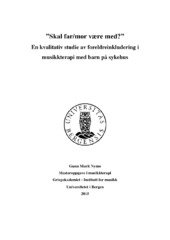"Skal far/mor være med?" En kvalitativ studie av foreldreinkludering i musikkterapi med barn på sykehus
Master thesis
Permanent lenke
https://hdl.handle.net/1956/11817Utgivelsesdato
2015-10-16Metadata
Vis full innførselSamlinger
Sammendrag
Fokuset i dette studiet er inkludering av foreldre i musikkterapi med barn på norske sykehus. Gjennom semistrukturert intervju, er tre musikkterapeuter som jobber eller har jobbet på sykehus sine erfaringer angående foreldreinkludering og de vurderinger som ligger til grunn for vedtaket om foreldreinkludering samlet inn. Teori om tilknytning, foreldreinkludering i musikkterapi generelt og kontekstuelle perspektiver om sykehus som arena for musikkterapi er vektlagt. Funnene viser at foreldreinkludering kan være, men ikke alltid er, et valg. Når foreldreinkludering er et valg, kan dette valget gjøres av hver av aktørene, begrunnet ut fra det juridiske rammeverket. Balansen mellom foreldre som barnets nærmeste versus barnets autonomi er drøftet og belyst av tilknytningsteori. Resultatene viser også at foreldreinkludering ofte er en positiv ressurs for alle aktørene, men det kan også innebære en utfordring for en eller flere av aktørene, og i noen tilfeller er foreldreinkludering ikke å foretrekke. Disse siste funnene er i samsvar med modeller for foreldreinkludering i musikkterapi generelt. Musikkterapeuter synes å ta beslutninger basert på faglige vurderinger. Is the father/mother going to take part?" A Qualitative study of parental inclusion in music therapy with children at hospitals The focus of this thesis is directed towards the question of whether or not to include parents when children in Norwegian hospitals receive music therapy. Through semi-structured interviews, experiences on parental inclusion and assessments which form the basis of the decision of parental inclusion are collected from three music therapists who work or have been working in hospitals. Theory on attachment, parental inclusion in music therapy and contextual perspectives regarding hospitals as the venue for music therapy are emphasized. The findings shows that parental inclusion can be, but not always are, a choice. When parental inclusion is a choice, this choice can be made by each of the participants in the music therapy, justified on the basis of legal framework. The balance between parents as the child's immediate versus the child's autonomy is discussed and illuminated by attachment theory. The findings also show that parental inclusion is often a positive resource for all the participants that take part, but can also be a challenge for one or several of the participants. In some occasions parental inclusion is not the preferable choice. These last findings are consistent with the models of parental inclusion in music therapy in general. The music therapists seems to take the decisions based on professional assessments.
